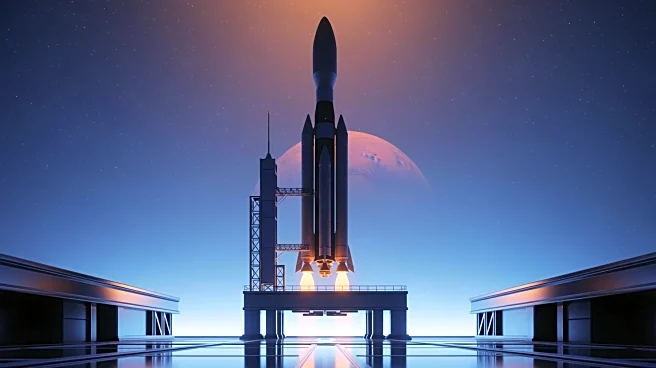What's Happening?
Blue Origin, founded by Jeff Bezos, is preparing to launch its New Glenn rocket from Cape Canaveral Space Force Station. The mission, carrying NASA's Escapade satellites, aims to test the rocket's capabilities
for a Mars mission. The launch window is set for Thursday afternoon, with Blue Origin hosting a livestream of the event. The mission was delayed due to weather and a solar storm, but the company has worked with the FAA to reschedule. The Escapade mission will mark the first flight of New Glenn with a customer payload, aiming to recover the rocket's first-stage booster for reuse.
Why It's Important?
This launch is a critical test for Blue Origin's New Glenn rocket, which is designed to be partially reusable to reduce costs. Successfully recovering the booster is essential for Blue Origin's business model, similar to its competitor SpaceX. The mission also supports NASA's SIMPLEx program, which encourages the use of small, cost-effective spacecraft for planetary exploration. The Escapade satellites will study Mars' atmosphere, providing valuable data for future exploration and understanding of the planet's history.
What's Next?
Once launched, the Escapade satellites will travel to Lagrange Point 2 before heading to Mars in 2026. They are expected to enter Martian orbit in September 2027, where they will begin their scientific mission. Blue Origin will continue to refine its rocket technology, focusing on successful booster recovery to enhance its competitive edge in the commercial launch market. The mission's success could lead to more partnerships and opportunities for Blue Origin in space exploration.
Beyond the Headlines
The mission highlights the growing role of private companies in space exploration, with Blue Origin and SpaceX leading the charge. The use of small, innovative spacecraft for planetary missions represents a shift towards more cost-effective exploration strategies. The data collected by the Escapade satellites could provide insights into Mars' atmospheric conditions, aiding future missions and potential human exploration.









